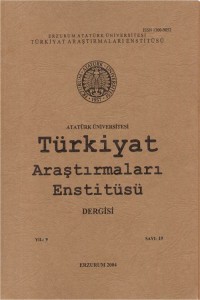Abstract
Atatürk, benzerlerinden farklı olarak egitimci bir kişilige
sahiptir. Onun egitim felsefesinin esasını;
i . Hür ve bagımsız bir TOrkiye,
2. Barışsever ve çalışkan bir ulus,
3. Güçlü ve lider bir ülke.
teşkil eder.
Atatürk'ün egitim düşüncesinde egitimin temel amaçları;
i. Medeni bir ülke
2. Aydın bir millet
yaratmak olarak belirlenebilir.
Atatürk'ün eğitim politikasınııı ilkeleri ise şöyle
sıralanabilir:
1. Milli eğitim
2. Çağdaş ve bilimsel egitim.
3. Hür ve yaratıcı eğitim.
4. Faydacı eğitim
S. Demokratik eğitim.
6. Uygulamalı eğitim.
7. Mesleki egitim.
8. Karma eğitim
9. Halk eğitimi.
1O. Düzenli ve disiplinli egitim.
11. Ögretmen merkezli, bireyselleştirilmiş
öğretim.
Atatürk, Türkiye'nin kalkınması meselesinin bir egitim
meselesi oldugunu gören Türk milli lideridir.
SUMMARY
What maken Atatürk recognizable and different from other
national leaders was his educationist personality.
His educationist philosophy is mainly based on the following
principles.
1. A free and indopendent Turkiye.
2. A peaceful and industrious nation.
3. A strong and a leading country
The main purposes ofeducation in his policy ofeducation are:
1. A civilized country
2. An intellectuel society.
The principıes ofeducation in his policy ofeducation are:
1. National edueation
2. Contemporary and scientific edueation.
3. Free and creative education
4. Progmatic education
5. Democratic education
6. Praetical education
7. Vocational education
8. Co-education
9. Adult education
LO. Organized and discipIined cducation
II. Teacher-Centered, individualized education.
Atatürk is the national leader of Turkish Nation who foresees
the edueation as the only means for the development of the
country.
Keywords
Details
| Primary Language | tr; en |
|---|---|
| Journal Section | Makaleler |
| Authors | |
| Publication Date | February 23, 2010 |
| Published in Issue | Year 2002 Volume: 9 Issue: 19 |


